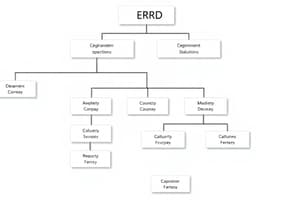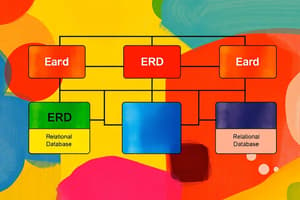Podcast
Questions and Answers
What is a relational database?
What is a relational database?
- A collection of unrelated data stored in multiple locations
- A collection of related data stored in a centralized location (correct)
- A software used for graphic design
- A type of non-relational database
What does ERD stand for?
What does ERD stand for?
Entity-Relationship Diagram
Normalization is the process of denormalizing data.
Normalization is the process of denormalizing data.
False (B)
The primary key in a database table is used to identify individual ______.
The primary key in a database table is used to identify individual ______.
Which of the following is NOT a data model mentioned?
Which of the following is NOT a data model mentioned?
What are the three types of data design processes?
What are the three types of data design processes?
What does SQL stand for?
What does SQL stand for?
What is the purpose of an Entity-Relationship Diagram (ERD)?
What is the purpose of an Entity-Relationship Diagram (ERD)?
In conceptual design, database tables are designed.
In conceptual design, database tables are designed.
Flashcards are hidden until you start studying
Study Notes
Relational Database Design
- A relational database is a centralized repository of related data, organized into tables that hold information about various objects.
- Tables are structured with unique identifiers, known as primary keys, that separate individual records.
- Foreign keys link different tables, establishing logical relationships among them.
- Relational databases are managed by a relational database management system (RDBMS), which utilizes Structured Query Language (SQL) for data retrieval and interaction.
Entity-Relationship Diagram (ERD)
- An ERD visually represents database design and outlines the relationships between entities.
- Diagrams illustrate business objects and their interactions within an information system.
- Crow’s foot notation is used to depict relationships—single lines indicate one-to-one relationships, while three-line crow’s feet show one-to-many relationships.
Database Design Models
- Database design involves three data models: conceptual, logical, and physical.
Conceptual Design
- Focuses on establishing entities, attributes, and relationships without detailing the database tables.
- Aims to provide a high-level overview of the system and its business objects, such as customers and products.
Logical Design
- Adds detail to the conceptual design, focusing on the structure and relationships among data elements.
- Defines attributes or columns for each entity which detail the information stored in database records.
- The logical design is independent of any specific database system, concentrating on data structure and relationships.
Studying That Suits You
Use AI to generate personalized quizzes and flashcards to suit your learning preferences.




